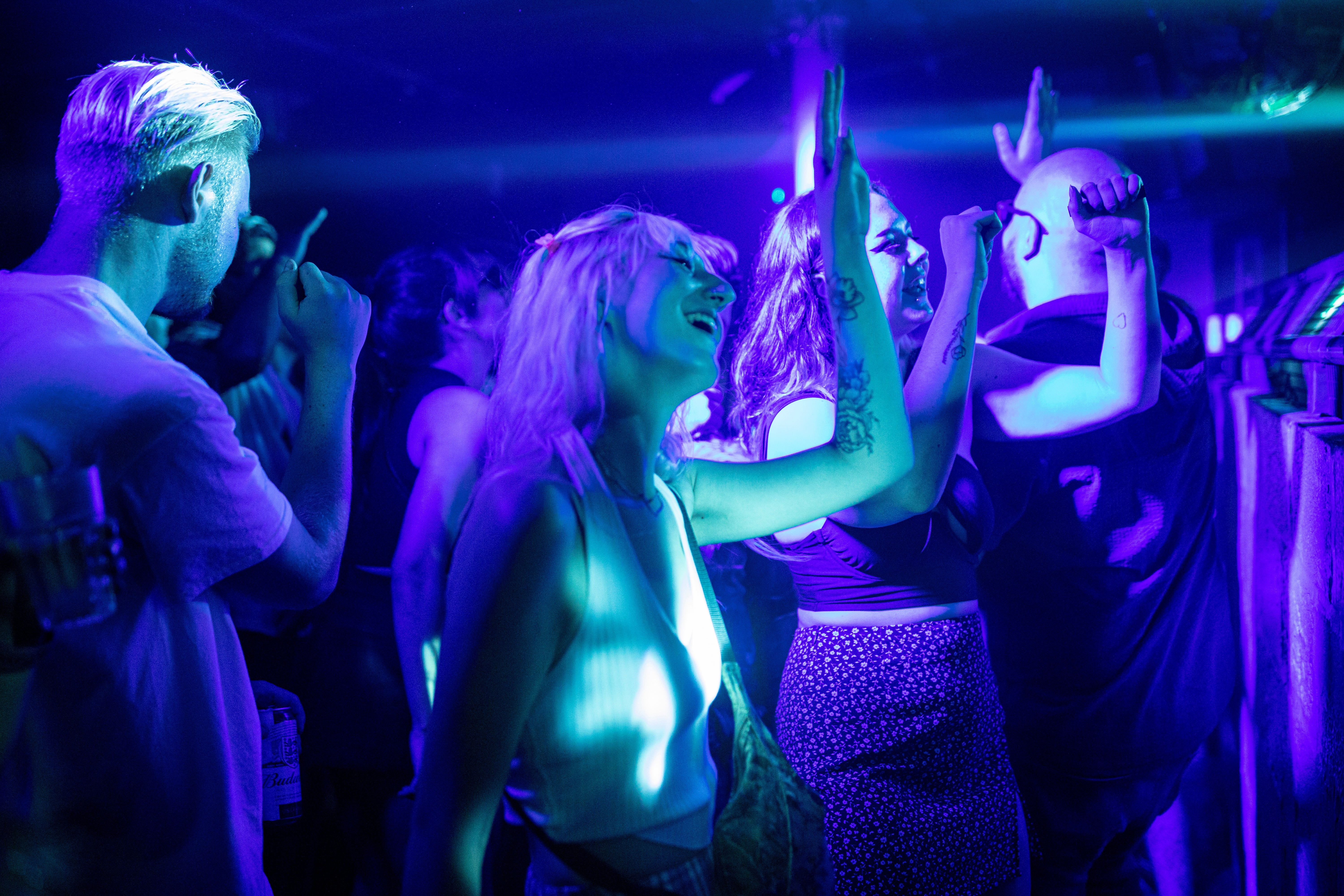‘It felt like a bad dream’: Drink spiking ‘often dismissed’ by police and NHS
‘It is the not knowing who it was, what you were spiked with, or what happened to you that night,’ lead campaigner who fears her drink was spiked tells Maya Oppenheim


Your support helps us to tell the story
From reproductive rights to climate change to Big Tech, The Independent is on the ground when the story is developing. Whether it's investigating the financials of Elon Musk's pro-Trump PAC or producing our latest documentary, 'The A Word', which shines a light on the American women fighting for reproductive rights, we know how important it is to parse out the facts from the messaging.
At such a critical moment in US history, we need reporters on the ground. Your donation allows us to keep sending journalists to speak to both sides of the story.
The Independent is trusted by Americans across the entire political spectrum. And unlike many other quality news outlets, we choose not to lock Americans out of our reporting and analysis with paywalls. We believe quality journalism should be available to everyone, paid for by those who can afford it.
Your support makes all the difference.“I split my chin and fractured my wrist. I had to go to A&E to have stitches. The nurse said: ‘Do you think you’ve been sexually assaulted?’”
It was then that a panicked Mair Howells burst into tears as it dawned on her she had no recollection of the night before so was unable to answer.
The 22-year-old, who told The Independent she was left sitting alone in hospital for hours in what felt like a “bad dream”, was told afterwards by a nurse she had likely been spiked.
Drink spiking has grabbed headlines in the past few weeks as reports emerged of women being injected with an unknown substance in nightclubs. Three police forces are looking into claims from women who believe they were spiked by needles, while boycotts of venues are taking place across the UK this week as students demand more security.
Despite the fact drink spiking has long been a growing problem in the UK, charities and campaigners have told The Independent incidents are often “dismissed” by both the police and the NHS, which generally does not carry out blood and urine tests to check if victims have been spiked.
Campaigners warn this means women who have been spiked are routinely being left with nowhere to turn.
Helena Conibear, chief executive of the Alcohol Education Trust, said those who report drink spiking find it is frequently “not taken seriously and dismissed” by both the police and the NHS. Many victims fear that they are not going to be believed due to their memory being “hazy”.
She said: “It is often not taken seriously and dismissed by police and health professionals. If someone has come into A&E, often very traumatised, sometimes having seizures, it is not enough to presume they haven’t been spiked. It should be the other way.”
The Independent contacted many leading organisations which span across these different sectors but the overwhelming majority refused to provide a statement or an interview – saying they do not know enough about the problem of drink spiking to comment.
Howells, who still has a scar under her lip from where she fell over that night, was at Bussey Building in Peckham when she believes her drink was spiked in February 2020.
“I went to a friend’s birthday,” she recalls. “I was relatively sober. I remember everything. I passed two drinks back to my friends. In that split moment, I did turn my back to my drink. From that moment I don’t remember anything until I woke up in bed the next day fully clothed. I’ve never blacked out before from drinking. I went from zero to 101.”
Howells explains it quickly emerged her sister was forced to take her home after finding her in the men’s toilets alone and bleeding. “I was locked in a cubicle by myself in the boys' toilets,” she adds. “By that point, I had lost control of my legs. And when she found me I was bleeding from my nose and my mouth.”
Left with a split chin and a fractured wrist, she was forced to go to the hospital where she was given stitches. As it happened during the early stages of the pandemic, she had to sit in the A&E department alone for four hours.
“At that moment, I needed support the most,” Howells says. “I was feeling disorientated. It felt like a bad dream. My mum did go to Bussey Building. The CCTV footage she saw was me arriving at the venue, going up the stairs totally fine and then coming out in such a state she didn’t recognise me. It was upsetting for her.”
Howells says her 19-year-old sister had been spiked two months before while at a pub for work Christmas drinks in east London. Afterwards, her mum called the Metropolitan Police to report the incident, who, she says, told her they needed a blood test to investigate further.
Once at the hospital, her sister was told they could not do a blood test, Howells recalls. She argues it is not the fault of the NHS but a lack of funding for testing, coupled with a dearth of concrete, clear policies on drink spiking.
“It is a grey area in public agencies where drink spiking is ignored and dismissed,” she adds. “My sister’s treatment and my treatment makes me really angry. It is quite a hopeless position to be in.
“Something really horrible and traumatic has happened but it feels like no one wants to help.”
Speaking to The Independent for a separate article, Adrian Boyle, the vice president of the Royal College of Emergency Medicine, said “fairly uniformly” the NHS does not test people who fear their drink was spiked, adding: “There is no hard policy on this. We would only do diagnostic tests where it was going to change the way we would manage patients in terms of physical health.”
The emergency medicine consultant also notes they do not routinely gather drug test samples for the police – adding that in most scenarios the responsibility belongs to forensic medical clinicians.
“Most police forces have a contract with a private company,” he adds. “If they were interested in prosecuting a crime, they do their own forensic work.”
Howells, who went on to set up campaign group Ivebeenspiked to raise awareness of drink spiking, said she has seen a surge in people coming forward to say they have been spiked since bars and clubs have reopened post-lockdown. This figure has risen even further since the spate of reports of needle attacks.
She said she routinely hears of people being spiked in big nightclubs in central London – with some winding up in hospital.
She said the hardest thing about coming to terms with her own incident was losing all sense of control.
“It is the not knowing who it was, what you were spiked with, or what happened to you that night,” she reflects.
“Imagine if I hadn’t been with people I trusted. Anything could have happened and I wouldn’t have known.”
Data seen by the BBC showed an increase in drinks being spiked, with more than 2,600 reports being made to police in England and Wales between 2015 to 2019. However, campaigners say these numbers are just the tip of the iceberg as many do not come forward.
While Rohypnol and Gamma Hydroxybutyrate (GHB) are the drugs most frequently used to spike victims, a whole range of intoxicants can be used. The drugs are especially high-risk when they are combined with alcohol due to the mixture having a highly powerful effect, even causing a coma or death in the worst case scenario.
“Drink spiking is a heinous act and a criminal offence,” said Elaine Hindal, chief executive of Drinkaware, a charity that strives to reduce alcohol misuse. “Although most reported victims of drink spiking are women, men are targeted, too, so it is crucial for everyone to know how to stay vigilant.”
Ms Hindal notes that if a drink has been spiked it is not likely that it will look, smell or taste any different – yet the repercussions can be profoundly serious. “Drinks can be spiked with more alcohol or with drugs, including date-rape drugs, with most taking effect within 15-30 minutes and symptoms usually lasting for several hours,” she added.
Sara Khan, vice president of liberation and equality at the National Union of Students, told The Independent they know drink spiking “happens all too regularly”.
Meanwhile, travel editor for Rough Guides, Annie Warren, has first-hand experience of the problem – suspecting she was spiked in a bar in London while she was with a group of friends back in 2017.
“We were just dancing,” the 28-year-old recalled. “We had been chatting to a group of guys earlier in the night, then later on I felt really, really drunk. All I’d had was a can of G&T and half a pint. I felt like I was going to pass out or be sick and that is the last I remember. A bouncer had to carry me out.”
Ms Warren then woke up in hospital three hours later with her friends around her. The paramedics in the ambulance and the hospital staff said they suspected she had been spiked but she never found out any details about what drug she consumed.
“I was a bit scared and a bit shocked,” she added. “It was like those scenes in a film when a character wakes up in hospital, and then suddenly it goes into focus with everyone around them. According to friends, I was sat on the floor acting paralytic drunk, and not making any sense in the bar. No words.”
According to her friends, she then completely passed out, and the bouncer carried her out and placed her on the curb outside, before calling an ambulance.
“That could have been really serious,” Ms Warren reflected. “Imagine if I hadn’t been with people I trusted.
“Anything could have happened and I wouldn’t have known. A really sinister thing could happen.”
The NHS and the National Police Chiefs’ Council have been approached for comment.






Join our commenting forum
Join thought-provoking conversations, follow other Independent readers and see their replies
Comments